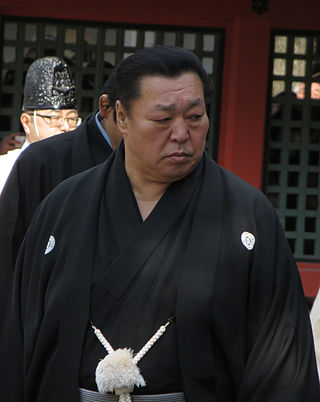Band or BAND may refer to:
Minato is Japanese for 'harbor', and may refer to:

A rikishi (力士), sumōtori (相撲取り) or, more colloquially, osumōsan (お相撲さん), is a professional sumo wrestler. Rikishi follow and live by the centuries-old rules of the sumo profession, with most coming from Japan, the only country where sumo is practiced professionally. Participation in official tournaments is the only means of marking achievement in sumo, with the rank of an individual rikishi based solely on official wins. The number of active rikishi peaked at 943 in May 1994, at the height of the "Waka-Taka boom," but had declined to 665 by January 2022.
Ōshima, Oshima, Ooshima or Ohshima may refer to:
The Japan Sumo Association is the body that operates and controls professional sumo wrestling in Japan under the jurisdiction of the Japanese Ministry of Education, Culture, Sports, Science and Technology (MEXT). Rikishi, gyōji (referees), tokoyama (hairdressers), and yobidashi (ushers/handymen), are all on the Association's payroll, but the organisation is run entirely by toshiyori (elders). The organization has its headquarters in Yokoami, Sumida, Tokyo.
A KO is a knockout in various sports, such as boxing and martial arts.

In sumo wrestling, a heya is an organization of sumo wrestlers where they train and live. It can also be termed sumo-beya. All wrestlers in professional sumo must belong to one. There are currently 43 heya, each of which belongs to one of five ichimon. They vary in size, with the largest heya having over thirty wrestlers and smallest just one wrestler. Most heya are based in and around the Ryōgoku district of Tokyo, sumo's traditional heartland, although the high price of land has led to some newer heya being built in other parts of Tokyo or its suburbs.

A shikona is a sumo wrestler's ring name. The tradition of ring names in sumo dates back to the Edo period, where they were used as a means to attract customers and hide the identities of the rikishi.
The following words are terms used in sumo wrestling in Japan.
In wrestling, stable has two similar but not entirely consistent meanings:
Toda is a Japanese surname. Notable people with the surname include:
This page is based on this
Wikipedia article Text is available under the
CC BY-SA 4.0 license; additional terms may apply.
Images, videos and audio are available under their respective licenses.


